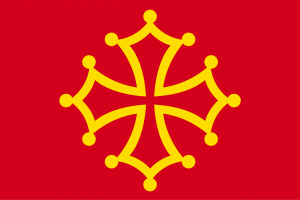Language/Occitan-post-1500/Grammar/How-to-Use-Be
Hi Occitan (post 1500) learners! 😊
In this lesson, we will learn how to use the verb "be" in Occitan (post 1500) grammar. If you're new to the language, make sure to check out the Grammar section on our website Polyglot Club first!
Consider exploring these related pages after completing this lesson: Pronouns, Conjugation, Prepositions & Verbs in Occitan.
What is the Verb "Be"?[edit | edit source]
The verb "be" is an essential verb in English and many other languages. It's used to link the subject of a sentence to information about the subject, such as its identity, location, state, or other qualities. For example, "I am a teacher.", "The book is on the table.", "She was happy.", "They will be here soon."
In Occitan (post 1500), the verb "be" has some similarities to the English verb, but also some differences in usage and conjugation. Let's explore this further.
Present Tense of "Be"[edit | edit source]
In Occitan (post 1500), the present tense of the verb "be" can be expressed in two ways: with the verbs "èsser" or "estar".
The verb "èsser" is used to indicate identity, profession, nationality, possession, or essential qualities of the subject. For example:
| Occitan (post 1500) | Pronunciation | English |
|---|---|---|
| Sèi | sey | I am |
| Es | es | You (singular) are |
| Es | es | He/She/It is |
| Sèm | sem | We are |
| Sètz | setz | You (plural) are |
| Son | son | They are |
The verb "estar" is used to indicate location, temporary qualities, changing states, emotions, or actions in progress. For example:
| Occitan (post 1500) | Pronunciation | English |
|---|---|---|
| Sei (/Estoi) a l'ostal. | sey (/estoy) a l’oustal | I am at home. |
| Es (/Estois) aquí. | es (/estoy) aqui | You (singular) are here. |
| Es (/Estois) fòra. | es (/estoy) fòra | He/She/It is outside. |
| Sèm (/Som) en còrsa. | sem (/som) en corsa | We are in class. |
| Sètz (/Sosatz) plan cansats. | setz (/sosatz) plan cansats | You (plural) are very tired. |
| Son (/Son) contents. | son (/son) contents | They are happy. |
Note that the pronunciation of "èsser" and "estar" varies by region and dialect.
Past Tense of "Be"[edit | edit source]
In Occitan (post 1500), the past tense of "be" is formed using the auxiliary verb "èsser" or "aver" and the participle of the main verb.
To form the past tense of "èsser", use the appropriate form of "èsser" for the subject, followed by the past participle of the main verb. For example:
- Sèi anat al mercat. (I have gone to the market.)
- Eres vengut amb nòstre grop. (You came with our group.)
- Es estat malauta. (He/She was sick.)
- Som estats a la mar. (We were at the sea.)
- Sètz tornats tard. (You (plural) came back late.)
- Son partits dempuèi quauques jorns. (They left a few days ago.)
To form the past tense of "avar", use the appropriate form of "aver" for the subject, followed by the past participle of the main verb. For example:
- Ai estat al cinèma. (I have been to the cinema.)
- As anat au trabalh. (You went to work.)
- A patit una malautia. (He/She had an illness.)
- Avèm manjat al restaurant. (We ate at the restaurant.)
- Avètz vist aquela pelicula? (Have you (plural) seen that movie?)
- An passat una bona serada. (They had a good evening.)
Dialogue[edit | edit source]
Here's a dialogue to help you practice using the verb "be":
- Armand: Sei contents d'estar aquí. (I'm happy to be here.)
- Léa: Es estat una bòna idèa de venir. (It was a good idea to come.)
- Armand: Es / es estada al ristorant hier? (Did you (singular) go to the restaurant yesterday?)
- Léa: Non, eri malauta. (No, I was sick.)
- Armand: Eres (/Estois) perfèctament ara? (Are you (singular) okay now?)
- Léa: Oc, va plan mielhs. (Yes, much better.)
Conclusion[edit | edit source]
Congratulations! You've learned how to use the verb "be" in Occitan (post 1500) grammar. It's an important verb to master, as it appears frequently in most types of sentences. To improve your skills, try practicing with a native speaker on Polyglot Club and ask them any questions. And don't forget to check out our Grammar section for more lessons on Occitan (post 1500) grammar.
➡ If you have any questions, please ask them in the comments section below.
➡ Feel free to edit this wiki page if you think it can be improved. 😎
Congratulations on finishing this lesson! Explore these related pages to keep learning: Definite Articles in Occitan, Occitan-post-1500, Plurals & Past Tense.

